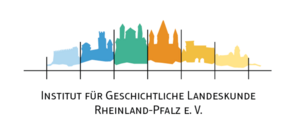Institute of Historical Regional Studies at Mainz University

Founded in 1960, the Institut für Geschichtliche Landeskunde an der Universität Mainz e.V. (IGL, ‘Institute for Historical Regional Studies at Mainz University’) is one of the most tradition-rich places for regional historical research in the Federal Republic of Germany. Currently, the institute is chaired by Mr. Prof Dr Michael Matheus who also holds the professorial chair of Middle and Early Modern History at Johannes-Gutenberg University, Mainz. Second chairmanship is held by Prof. Dr. Damaris Nübling, holder of the professorial chair of Historical Linguistics of German, also at Mainz University.
IGL is known for its multidisciplinary work and therefore consists of two departments, “History of Country and Constitution” and “Regional Studies on Language and Tribes”. In these departments, four full-time scientists are engaged in basic research on the history of today’s federal state of Rhineland-Palatine and its bordering areas. Additionally, students and scientific assistants support numerous research projects about all eras of Rhineland-Palatine’s history. Projects with third-party funding, such as the tri-national DFG project “Das Anna und ihr Hund – Weibliche Rufnamen im Neutrum” (‘The Anna and its Dog – Female Nicknames as Neuter’), are also located at the IGL.
The institute directs towards a scientific community as well as the public at large, due to its many events such as colloquia, lectures and excursions as well as its several publications. The edition of “Ingelheimer Haderbücher” should here be named as one of the most excellent projects, which has been funded by the Ingelheimer Kulturbesitz Foundation, Boehringer Ingelheim and the city of Ingelheim since 2011. It is published regularly in several parts.
To provide an easy access to historical research and its results, IGL early started to grasp the chances of digitalization and the internet. As of today, developing and providing online platforms for historical subjects are equally important to the institute as their core research. These platforms cover several wide-spread topics, such as History of Democracy (www.demokratiegeschichte.eu), First World War in Rhineland-Palatine (www.erster-weltkrieg-rlp.de) or emigration from this very state (www.auswanderung-rlp.de).
IGL is also committed to “citizen science”, based on its slogan “Research – Imparting – Participate”, and builds a bridge between historical laymen and the scientific world with its easy to understand online platforms. As part of www.regionalgeschichte.net, citizens and historical societies are asked to participate by providing articles and historical sources to expand the project even more.
Another special aspect of IGL’s dedication to citizen science is the “Geschichtsmobil” (‘History Bus’), a mobile research station operated by the IGL. Since 2009, it regularly travels through the country and visits cities and communities as well as the annual Rhineland-Palatine-Day to provide individual exhibitions, interactive education and a chance to get in touch with interested people at those locations.
The IGL is a member of the Mainzer Wissenschaftsallianz (MWA) since the latter was founded in 2008 and therefore participates in the annual Mainzer Wissenschaftsmarkt (‘Mainz Science Fair’) and other events organized by the alliance.
Additionally, IGL administrates the “Mainzer Zentrum für Digitalität in den Geistes- und Kulturwissenschaften” (mainzed, ‘Mainz Center for Digitalization in Humanities and Culture Studies’) in cooperation with five other members of the MWA since its foundation in November, 2015.
